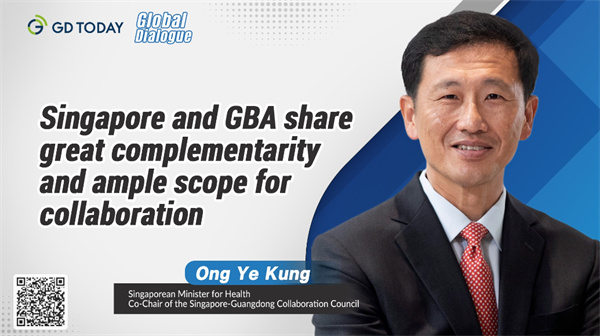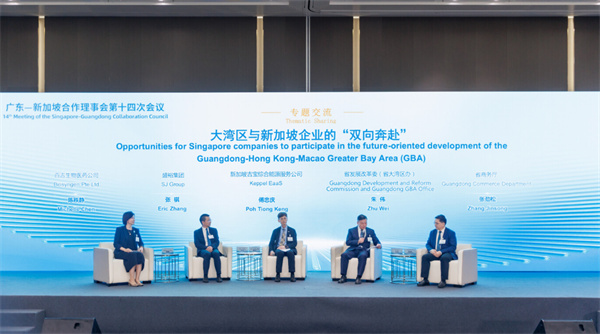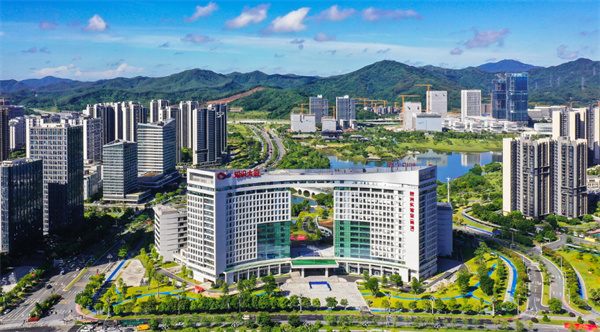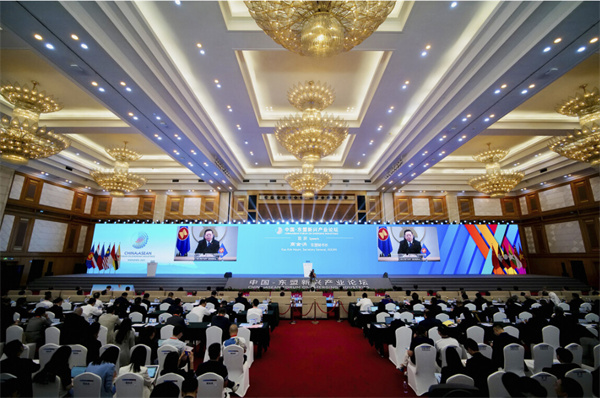"Over the years, Singapore and Guangdong's collaboration in key sectors has generated spin-off effects at the regional level. For example, robust trade and supply chain networks now straddle regions," said Singaporean Minister for Health Ong Ye Kung in a recent exclusive interview with GDToday.
"We share good economic relations, with Guangdong maintaining its position as Singapore's top provincial trading partner in China for the last 35 years in a row," he elaborated.
Ong, co-chair of the Singapore-Guangdong Collaboration Council (SGCC), believes that Guangdong Province will continue to play a key role in supporting China's next phase of growth and development, as the country is dedicated to further deepening reform comprehensively and promoting high-quality development.

High-quality partnerships seen between Singapore and Guangdong
SGCC was established in 2009 with the objective of promoting broader exchanges and cooperation between the business communities of Singapore and Guangdong.
The latest SGCC meeting was held on July 31, 2024, at the China-Singapore Guangzhou Knowledge City (CSGKC), where 20 projects were signed covering areas such as sustainability and green economy, health and biomedical, and agritech.

The 14th Meeting of the Singapore-Guangdong Collaboration Council was held in Guangzhou, Guangdong Province, on July 31, 2024. (Photo: SGCC)
After co-chairing the SGCC meeting for the seventh time in 2024, Ong told GDToday that the platform has been productive and effective and seen "good progress" in Singapore-Guangdong cooperation.
He cited the example of the Singapore-China (Shenzhen) Smart City Initiative (SCI), where the two sides have been driving talent exchanges and facilitating digitalization of trade documentation. "Since 2020, 43 projects have been launched under the initiative. Our companies are leveraging the talent base in Shenzhen to develop IT and AI solutions."
The SCI was launched in 2019 to build stronger digital and business linkages between Singapore and Shenzhen, with three core pillars for collaboration, including digital connectivity, innovation and entrepreneurship, and tech talent development.
CSGKC is another important platform and a flagship project to catalyse high-quality partnerships between Singapore and Guangdong.
"It is a key landing pad for Singapore companies to access the Guangdong-Hong Kong-Macao Greater Bay Area (GBA). Over the years, the project has done well to build up a strong business environment and supporting ecosystems in industries such as biomedicine, semiconductors, and electric vehicles," said Ong.
CSGKC has so far secured over 100 high-quality Singaporean enterprises such as Biosyngen, LionTCR, and Singrow and attracted more than 300 additional foreign companies competing to establish their presence there.
"I encourage more Singapore companies to continue leveraging the platform to test bed solutions and pilot new projects in Guangdong and the GBA," said Ong.
He added that the GBA, which connects nine Guangdong cities with Hong Kong and Macao, has strong economic potential. "By themselves, the cities have their own strengths and traditional advantages. The GBA further draws on the synergy among the cities and can bring about economic growth that is higher than the sum of its parts."
As Singapore serves as a regional hub and a pathfinder for companies hoping to tap into the growth potential in Southeast Asia, Ong believes Singapore and the GBA foresee a great deal of complementarity and ample scope for collaboration.

China-Singapore Guangzhou Knowledge City. (Photo: CFP)
Singapore-Guangdong cooperation, a 'pathfinder' for regional relations
"As part of the ASEAN region, Singapore strives to play the constructive role of a pathfinder," Ong told GDToday.
Through forging bilateral collaborations internally and externally, such as Singapore's cooperation with Guangdong, and discovering new modalities for partnership, Ong hopes these collaborations can, over time, expand into broader region-to-region cooperation. "In this way, we hope to contribute towards broader ASEAN-China relations too."
"ASEAN is China's largest trading partner. As many Chinese companies, including those in Guangdong, are 'going out' to expand their market and operations overseas, Singapore can serve as a springboard for these Chinese companies to expand into ASEAN," said Ong.
Singapore is China's fifth-largest trading partner among ASEAN member states, and China has been Singapore's largest trading partner for 11 consecutive years. In 2023, bilateral trade reached 108.39 billion USD, according to China's Foreign Ministry.

The China-ASEAN Forum on Emerging Industries was held in Shenzhen on July 4, 2023. (Photo: CFP)
Ong noted that Singapore's attractiveness as a hub to expand into the global market or as a tourist destination has been further enhanced by the mutual visa exemption agreement between China and Singapore, which took effect in February 2024. "This opens up even more opportunities for Singapore and also increases the convenience for Singaporean businesses looking to expand into the Chinese market."
China has been making efforts to facilitate travel and tourism with more countries through easier entry policies, including a 144-hour visa-free transit policy that has expanded to 37 entry ports and 57 countries, and pilot visa-free policies for some countries.
"Encouraging people-to-people exchanges is crucial for fostering mutual understanding and building strong foundations for future cooperation," said Ong.
He further emphasized the significance of cultural and educational exchanges among the youth. "It is important that our young people know each other and make friends with each other, planting the seeds for future, larger cooperation."
Ong took Business China's Singapore-China Youth Interns Exchange Scheme (YES) as an example, saying 15 youths are currently pursuing internships in Shenzhen, Guangzhou, and Jiangmen, all of which are cities in Guangdong.
Launched in 2023, YES is an agreement signed between Singapore and China, which allows eligible youths to intern full-time in each other's country for up to six months with big names such as Trip.com, OCBC China, and CapitaLand Investment.
"We are encouraged by China's determination to stay on the path of reform and opening up." Ong believes that this will not only bring about progress and development to China but also improve the lives of people globally and bring peace and stability to the world.
"Mr. Lee Kuan Yew was instrumental in establishing the current trajectory of Singapore-China relations. He foresaw the profound impact of China's growth, reform, and opening up on the region and the world. Today, we continue the work that this earlier generation of leaders on both sides have laid for us," said Ong.
Reporter | Lydia Liu, Steven Yuen
Poster designer | Mia Lai
Editor | Monica Liu, James
Clonde Zhang and Yang Lin (intern) also contributed to the story.
